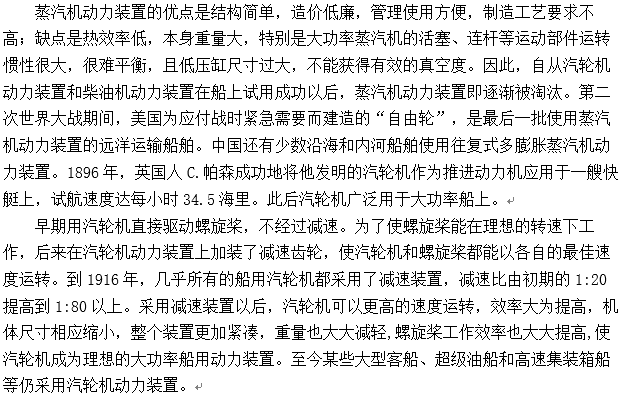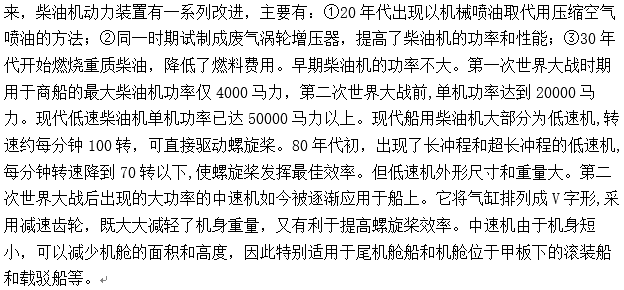船舶能效操作与管理分析毕业论文
2021-03-15 20:53:15
摘 要
能源是国民经济的基础,在社会可持续发展中起着举足轻重的作用。在所有交通运输载运工具中,船舶载运量最大,它的能源利用率大小会直接影响国民经济。人类活动排放的温室气体加剧了全球气候变暖的步伐,航运业的二氧化碳排放量占有很大比重,为了减少全球性极端气候变化对自然生态系统和人类生存环境带来的威胁,我们应该未雨绸缪,提前采取措施,提高船舶能效,减少温室气体的排放。
本文从船舶能效操作与管理的背景及要求分析、船舶能效设计指数计算分析、船舶能效操作与管理的国际、国内政策及法规分析、船舶能效管理计划(SEEMP)分析、营运船舶的最佳操作与管理分析五个方面展开研究,研究结果表明:船舶能效的提升主要通过降低船舶航行阻力、提高推进效率、机械设备的改良、最优管理和操作等4个方面来进行提升,减排措施的结果依赖于船舶尺度和船舶有关的操作模式。
本文的特色:在对国际政策和国内法规的研究下,对船舶能效设计指数深入剖析,在文中对公式中参数的选取和船舶能效设计指数的验证方法进行了详细的阐述。
关键词:船舶能效、设计指数、管理分析、政策法规。
Abstract
Energy is the foundation of the national economy and plays a pivotal role in the sustainable development of society. Ship as the transport capacity of the largest carrying capacity of transport vehicles, the energy efficiency of the national economy is very good or bad. Greenhouse gas emissions from human activities exacerbate the pace of global warming, the shipping industry's carbon dioxide emissions account for a large proportion, in order to reduce the global extreme climate change on natural ecosystems and human living environment threat, we should take precautions, Take measures in advance to improve the efficiency of the ship to reduce greenhouse gas emissions.
This paper analyzes the background and requirements of ship energy efficiency operation and management, the analysis and analysis of ship energy efficiency design index (EEDI), the international and domestic policies and regulations of ship energy efficiency operation and management, the analysis of ship energy efficiency management plan (SEEMP) Good operation and management analysis. The results show that the improvement of the energy efficiency of the ship is mainly through the four aspects of reducing the ship's resistance, improving the propulsion efficiency, improving the mechanical equipment, optimizing the management and operation. The effect depends on the ship scale and the ship-related operating mode.
The characteristics of this paper: Under the study of international policy and domestic regulations, the paper analyzes the design index of ship energy efficiency in detail, and selects the parameters in the formula and the verification method of ship energy efficiency design index.
Key Words:Ship energy efficiency operation, design index, management analysis,Policies and regulations.
目 录
第1章 绪论 1
1.1 船舶主机的发展沿革 1
1.2 自然环境的改变 2
第2章 船舶能效设计指数EEDI的计算分析 4
2.1 船舶能效计算公式EEDI介绍 4
2.2 EEDI适用船型介绍 8
2.3 EEDI基线公式确定 8
2.3.1 油船分析 12
2.3.2 散货船及集装箱船分析 13
2.4 EEDI敏感度分析 15
2.4.1 载重量对EEDI的影响 15
2.4.2 船舶主机功率对船舶EEDI的影响 16
2.5 使用新能源船舶 17
2.5.1 LNG船舶 17
2.5.2 风能船舶 18
2.5.3 太阳能船舶 19
2.5.4 生物能船舶 19
2.5.5 核能船舶 19
2.5.6 海洋能在船舶上应用前景 19
2.6 优化船型设计,减少船舶阻力 20
第3章 船舶能效管理计划(SEEMP)分析 22
3.1 SEEMP的一般要求 22
3.2 SEEMP的策划 23
3.3 SEEMP的实施 25
3.4 SEEMP的监测 25
3.5 SEEMP的评估改进 26
第4章 营运船舶燃油能效的最佳操作与管理分析 28
4.1 实现船舶营运燃油能效的最佳操作(Best Practices)导则 28
4.2 公司对船舶的营运管理 29
结论 34
参考文献 34
致谢 35
第1章 绪论
1.1 船舶主机的发展沿革

 1776年詹姆斯·瓦特生产出世界上第一台具有真正意义的蒸汽机。用煤、木炭、石油或者天然气作燃料,效率高,在当时作为工业生产的动力机器。从此,人类进入了蒸汽时代,机器生产逐步取代手工劳动,开辟了人类利用能源的新时代,它被广泛地应用在工厂成为几乎所有机器的动力,航运业也不例外,首先应用于船舶的蒸汽机是一台往复式蒸汽机,1807年,美国的工程师富尔顿首次将往复式蒸汽机应用于轮船的动力装置并取得成功,由于正在技术还不成熟,所以速度很低,每小时只能航行5英里,随着时间流逝,科技也在发展,20世纪初时,蒸汽机的结构为多级膨胀立式结构,很广泛的应用于船舶动力方面,20世纪初的豪华客船的推进装置都为蒸汽机,蒸汽机动力装置的发展已经非常完美。
1776年詹姆斯·瓦特生产出世界上第一台具有真正意义的蒸汽机。用煤、木炭、石油或者天然气作燃料,效率高,在当时作为工业生产的动力机器。从此,人类进入了蒸汽时代,机器生产逐步取代手工劳动,开辟了人类利用能源的新时代,它被广泛地应用在工厂成为几乎所有机器的动力,航运业也不例外,首先应用于船舶的蒸汽机是一台往复式蒸汽机,1807年,美国的工程师富尔顿首次将往复式蒸汽机应用于轮船的动力装置并取得成功,由于正在技术还不成熟,所以速度很低,每小时只能航行5英里,随着时间流逝,科技也在发展,20世纪初时,蒸汽机的结构为多级膨胀立式结构,很广泛的应用于船舶动力方面,20世纪初的豪华客船的推进装置都为蒸汽机,蒸汽机动力装置的发展已经非常完美。
 经过不断的改进,柴油机动力装置日臻完善,它的燃料消耗量最低,能使用廉价的渣油,可靠性较高,检修期间隔长达30000小时以上,热效率接近50%,因此成为目前应用最广的船舶动力装置[1]。
经过不断的改进,柴油机动力装置日臻完善,它的燃料消耗量最低,能使用廉价的渣油,可靠性较高,检修期间隔长达30000小时以上,热效率接近50%,因此成为目前应用最广的船舶动力装置[1]。




